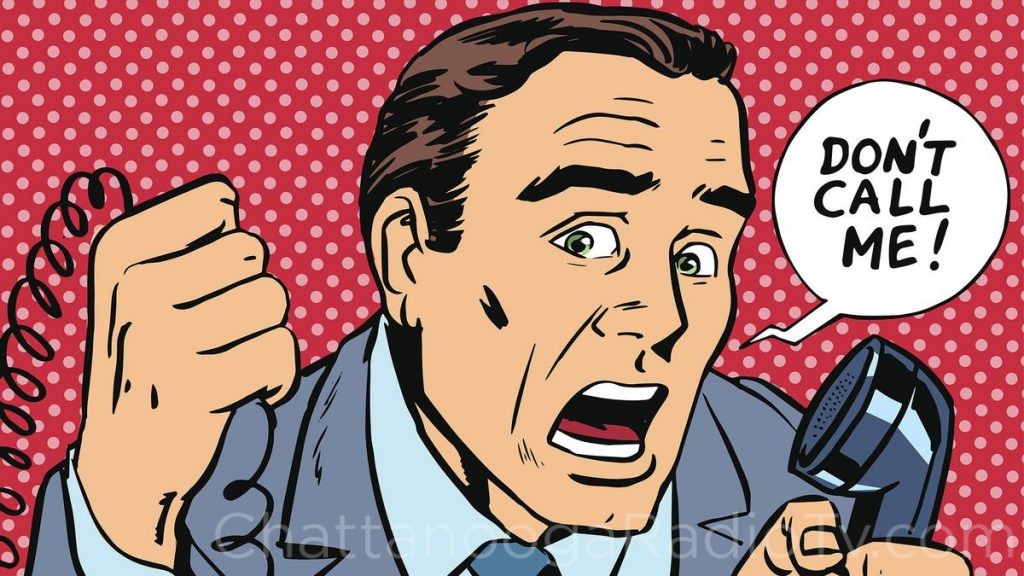It happens when I’m in the car. It happens when I’m on the air. It happens daily, everywhere.
This sounds like a tribute to Dr. Seuss, but it’s really my rant about telemarketing calls. What was once an occasional annoyance is now a frequent pain in the phone.
I mentioned this to some friends, and was comforted to know that it isn’t just me. They are also being bombarded by people who speak poor English, usually calling themselves “Rick,” “Lori,” or “Steve.” We know better.
Scams and rip-offs are nothing new. For years, seedy folks have stayed up late at night figuring out ways to cheat us out of our money.
Some do it face to face. They’ll knock on your door, and offer you a great deal on patching your driveway. “We just happen to have some tar and gravel left over from a job down the street.” They take your cash, dump a few rocks by the mailbox, and away they go. “Did it sound too good to be true?” the police officer asks. “Well, yeah it did.” And off they go to find their next victim.
Others do it by mail, which has proven to be a goldmine. Phony preachers, bogus charities, and poorly made products have drained the savings accounts of too many people.
When I was growing up, an elderly man who lived alone in a rotting house would cash his monthly check, and send a stack of twenty-dollar bills to a TV preacher. Eventually, his relatives found out, having long wondered why he was living in squalor. After they convinced him to stop, the letters from the phony preacher became more urgent in tone, threatening to stop praying for the man unless he mailed in another wad of cash. I later learned this was their standard ploy, trying to frighten their elderly victims into surrendering their money.
Technology has come a long way, and the con artists have kept up. The volume of junk in our mailbox has decreased but the scams have simply moved to our inbox. Remember the first time you got an e-mail from a friend or loved one? What a great day that was! We enjoyed instant communication without putting a pen to paper, or licking a postage stamp.
Now, checking your e-mail is a dreaded task. In addition to the birthday wishes from Aunt Martha and the update from your son in Montana, you must wade through a mine field of fake contests and Nigerian princes wanting to share their fortune.
When we started deleting those messages, the scammers followed us to Facebook. Now we are deluged by bogus coupons promising that our favorite store will give us $200 off a $220 purchase. Before many folks consider the economic crisis that would shut down any business that makes such a promise, they forward it to all their friends, who then send it to you and me. The result? The store spends valuable time apologizing for a hoax it didn’t create, and everyone who clicked on that coupon is a potential victim of identity theft.
Somehow, I became a recent victim of identity theft. I try to be careful, as has the rest of my family. We shred our documents, we don’t give out sensitive information on the phone, and we change our account passwords regularly. But unlike the old days, when you got change for a twenty, and stuffed it into your wallet, thieves don’t have to reach into your back pocket to steal your ID.
Was my information stolen from the gas pumps? From swiping my credit card through the reader at the store? Was there a receipt I failed to shred? Fraud investigators have no idea. It’s worldwide, they say. The scammers will apply for a credit card using your name, a phone number in Tupelo, an e-mail address registered to someone in Oklahoma, and it’s all done from a computer somewhere in Malaysia.
Fortunately, with the help of a couple of credit card companies with fraud prevention departments, nothing was charged to my account, not yet anyway. However, the precious time I’ve spent contacting banks and credit reporting agencies has taught me to be even more careful.
The next time you see an unfamiliar phone number on your Caller ID, almost always from some random American city, don’t answer. Even if you love to taunt telemarketers, the experts advise to resist the temptation.
The Do Not Call registry appears to be worthless, and blocking the numbers can’t hurt, but doesn’t seem to help either. There’s no real cure to stop the calls, but the less contact you have with these people, the better. If you’re afraid you might miss an important call, consider this. If it’s someone you love, and it’s important, they will leave a message. Otherwise, ignore these calls. Don’t feed the beast.




Good to hear from you again David. And yes, it is unbelievable the amount of garbage I get on emails, texts and phone calls. Your advice is so correct, just don’t answer calls from numbers you don’t recognize, delete any emails promising too good to be true deals and that goes for weird text messages too. Sorry you became a victim of this nonsense – it is one of my biggest fears right now.
David, Last week I had three telemarketers call the radio station hotline (a private unlisted number) to sell me something. I am sick of all telephones! I think I am going to throw mine out the car window.
I didn’t know I wanted to back to college! Never went in first place, but the calls I get, telling me “You have an award waiting for you” Go back to college free. Or “We see you traveled on our cruise line recently, we can get you a big discout for going again”. I even ask where I went, funny I’ve never been on a cruise.
Oh, David! The robo calls are a royal pain! I have a call block button on my phone and I use it every day several times a day. If I don’t recognize the name or number I hit that button!